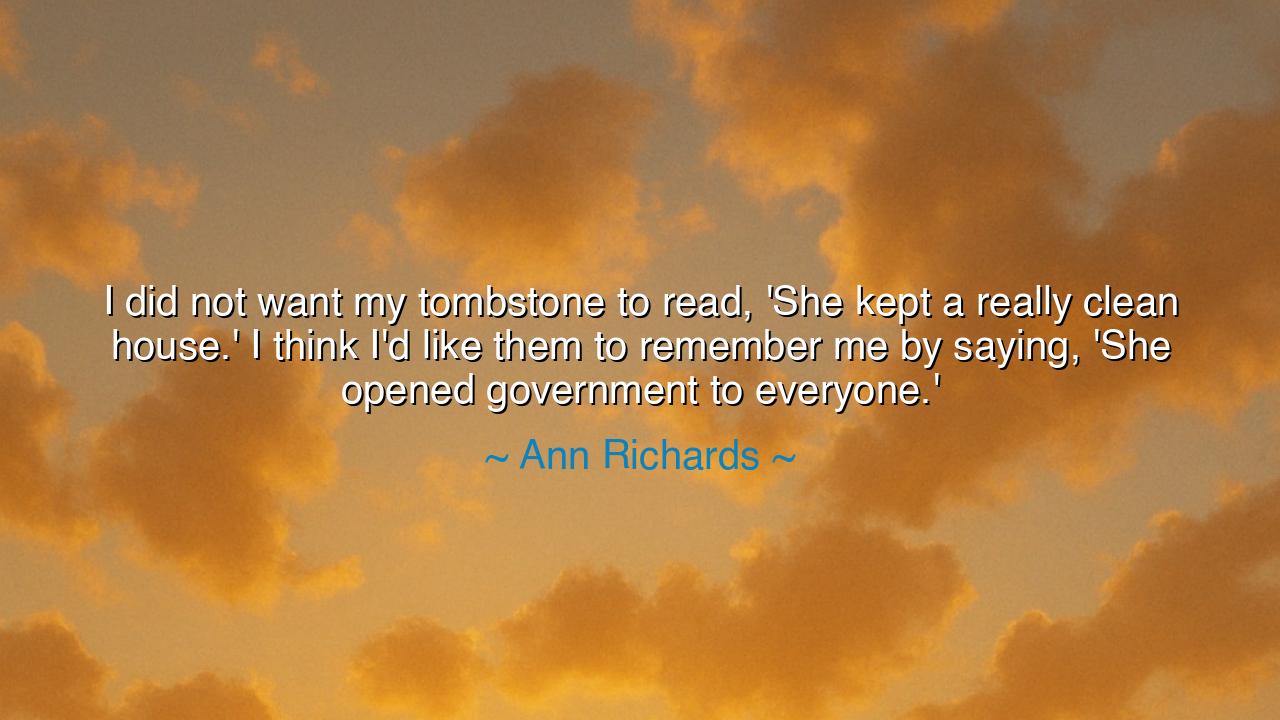
I did not want my tombstone to read, 'She kept a really clean
I did not want my tombstone to read, 'She kept a really clean house.' I think I'd like them to remember me by saying, 'She opened government to everyone.'






"I did not want my tombstone to read, 'She kept a really clean house.' I think I'd like them to remember me by saying, 'She opened government to everyone.'" — Ann Richards
Hear now, O seekers of purpose, the words of Ann Richards, a woman of wit and will, who rose from the dust of ordinary life to stand among the mighty. Her words are not about death, but about legacy — not about the chores of daily life, but about the call to something greater. When she said, "I did not want my tombstone to read, 'She kept a really clean house,'" she was rejecting the narrow box into which the world often places women — the notion that their worth lies only in the domestic, the quiet, the unseen. Instead, she longed to be remembered as one who opened government to everyone, as one who widened the gates of power so that others, long shut out, could finally enter.
This quote was born from the heart of a leader who walked the long, hard road of public service. Ann Richards, the fiery Governor of Texas, was no stranger to the weight of expectation. In her time, women in politics were still treated as guests in a house not their own. Yet she refused to live quietly or to shrink before tradition. Her humor was sharp, her courage unflinching, and her belief in inclusion unwavering. When she spoke these words, she was declaring that the true measure of a life is not found in tidiness or conformity, but in the doors one opens for others — for every citizen, every voice, every soul that seeks to be heard.
Her message reaches beyond gender, beyond time. It speaks to all who wrestle between the duties of the small and the demands of the great. Many live and die without ever lifting their eyes from their own hearth, believing that safety is virtue and that service begins and ends within the walls of their homes. But Richards reminds us that a clean house cannot change the world, while an open heart, an open hand, and an open government can. The truest cleanliness is that of conscience — to live not just for oneself, but for the good of all.
Consider, too, the example of Eleanor Roosevelt, who, like Richards, refused to remain silent within the boundaries others drew for her. She was told her duty was to host tea parties and smile beside her husband. Yet she transformed that expectation into power — traveling the world, speaking for the voiceless, and helping to craft the Universal Declaration of Human Rights. Like Ann Richards, she understood that greatness is not found in perfection, but in participation. Both women taught us that to serve humanity is the highest form of keeping one’s house — the house of society, the house of justice, the house of the human spirit.
There is something deeply heroic in Richards’ defiance. She speaks for every person — especially every woman — who refuses to be defined by what the world expects of them. Her words carry the scent of rebellion, not against order, but against limitation. She would rather be remembered for breaking walls than for polishing floors; for inviting others to the table of power rather than keeping the table spotless. In that truth lies the essence of leadership: to live a life that expands freedom for others, to make the world larger than it was when you found it.
Yet her wisdom is not only for the powerful. It is a torch for every soul who wishes to live meaningfully. Each of us, in our own way, must ask: What shall my tombstone say? Will it speak of small achievements, safe and spotless but forgettable? Or will it tell of doors opened, minds awakened, and hearts inspired? The question is not how clean our homes were, but how open our lives became — to compassion, to justice, to the needs of our neighbors and the cries of the unheard.
So, my children of tomorrow, learn from Ann Richards: do not seek to be perfect — seek to be useful. Sweep not only your floors, but the dust from the corridors of indifference. Polish not only your tables, but the windows of opportunity for others. Let your life be a beacon, not a trophy. If you hold power, share it. If you hold privilege, widen it. For when you leave this world, may it be said not that you lived neatly, but that you lived nobly — and that through your courage, you helped open the gates of the possible for all.






AAdministratorAdministrator
Welcome, honored guests. Please leave a comment, we will respond soon